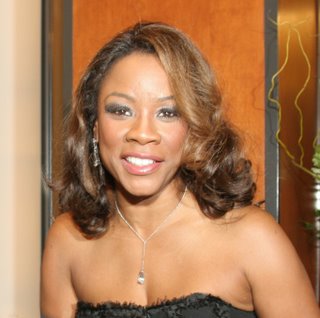Denyce Graves at the WPAS Gala Recital
 If you want to sell out the Kennedy Center's Concert Hall, you can rely on a select few names that will do the trick. Yo-Yo Ma is universally popular (and impeccably skilled, of course), Joshua Bell will fill any American venue (even if he is not exactly a "violinist's violinist"). Denyce Graves, a little past the zenith of her career, will always have her home crowd in Washington eat out of the palm of her hand. To review an artist so beloved by the crowd (uncritically, perhaps, but revered nonetheless) is an uncomfortable situation when the result is not quite as glorious as one wishes it to be.
If you want to sell out the Kennedy Center's Concert Hall, you can rely on a select few names that will do the trick. Yo-Yo Ma is universally popular (and impeccably skilled, of course), Joshua Bell will fill any American venue (even if he is not exactly a "violinist's violinist"). Denyce Graves, a little past the zenith of her career, will always have her home crowd in Washington eat out of the palm of her hand. To review an artist so beloved by the crowd (uncritically, perhaps, but revered nonetheless) is an uncomfortable situation when the result is not quite as glorious as one wishes it to be.
Ms. Graves' voice has changed severely over the last five years, and the performances I have heard from her in recent years (Trovatore, Sheherazade, Bluebeard) offered more concern than delight. The Washington Performing Arts Society's season opening gala recital last Tuesday was no different.
Stunning in appearance and with enough volume in her voice to reach even the last listener on the Kennedy Center's second tier, she offers a very individual sound with earthy and sonorous - almost manly (a compliment!) low notes. A spell with health problems involving the vocal chords must have taken its toll on the upper reaches, however. Frayed, strained, torn, and unsteady - even unpleasant to these ears, this is not what we can still admire on her earlier recordings.
As if to defy this challenge, Ms. Graves picked a difficult and long program for this recital... a program that even had to be pruned down to fit the time constraints. Gluck (most appreciated) with O Del Mio Dolce Ardor and Purcell (Thy Hand, Belinda! When I am laid in Earth) had a difficult start but improved notably as pitches became less ambiguous.
Early Classical and Baroque arias contrasted sharply with Schubert Lieder: Heimliches Lieben (D. 922), Der Tod und das Mädchen (D. 531 - from which the second movement's motive and name of the String Quartet no. 14 come), Lied der Mignon (D. 877/4), and Gretchen am Spinnrade were a feast for Graves enthusiasts but less so for sticklers for traditional Schubert song singing. Opening notes were often out of focus, the text wrapped in a uniform, thick haze. (But those haunting low notes sent ripples of murmuring astonishment through the crowd.)
Grace Jean, Graves, Once More With Feeling (Washington Post, October 12) |
Picking apart a performance for flaws is - despite rumors to the contrary - not fun for a critic. Even cynics should be able to derive pleasure from all but the worst performances. The problems (add an occasionally excessive vibrato) duly noted, it is more helpful to hunt for the goodies and joys in it. So inclined, there was plenty to come up with in Acerba voluttà (from Cilea's Adriana Lecouvreur) and Fia dunque vero, oh crudel! (from Donizetti's La Favorita)... not the least of which was Donizetti's music and Denyce Graves' "torment" - a characterization she has down to pat.
Ms. Graves - like perhaps only Renée Fleming - knows how to stun on entrance alone: the way she carries herself and chooses dresses that dazzle is elevated to its own art form with her. Salud's Aria from Manuel de Falla's La Vida Breve (Ars Longa?) was the immediate beneficiary. Warren Jones, who had accompanied with a soft and subtle touch, especially effective in the Italian sections, now got his deserved place in the limelight with a pianistic intermezzo of Brahms works. Appropriately it opened with Intermezzo, op. 118, no. 1, followed by Capriccio, op. 76, no. 5 (very lively), and the Rhapsody, op. 76, no. 2 (robust, engaged, and engaging). On matters of wardrobe, however, he took a distant second place to Ms. Graves: the ashen-black turtleneck would well have been replaced by a crisp white shirt; a belt might have been desirable, too.
In composer Robert Saari's presence, his song triptych "When the Forsythia blooms" opened its soft and delicate petals. Romantic and conventional, these young songs were nothing if not beautiful; contemporary and timeless in content, with a charming American accent in the second part, Faceless, and gently soaring and melancholic in For a Dream.
Scandalize my Name, Prayer, and Git on Board were the stuff that brought out the best in Graves and had the audience in amused, moved, touched, and delighted rapture. Delivered to perfection and well chosen, they were "all that" and more than deserved the wild cheers of the crowd. An inserted mournful spiritual (Heaven) was a moving dedication to the memory of Thomas Stewart. The encores teased out of her were When I Have Sung My Songs by Ernest Charles and The Joint is Really Jumpin' by Roger Edens, Ralph Blane, and Hugh Martin.





















































2 comments:
Wait wait wait. Are you suggesting that Renee “No Gay Friends” Fleming has good fashion sense?
she knows how to dazzle. and perhaps the key to dazzling diva-style is being 'dunn-up' without being sexually appealing (and therefore a threat to half the audience). it would explain the odd category of dress that is the "ball gown".
Post a Comment